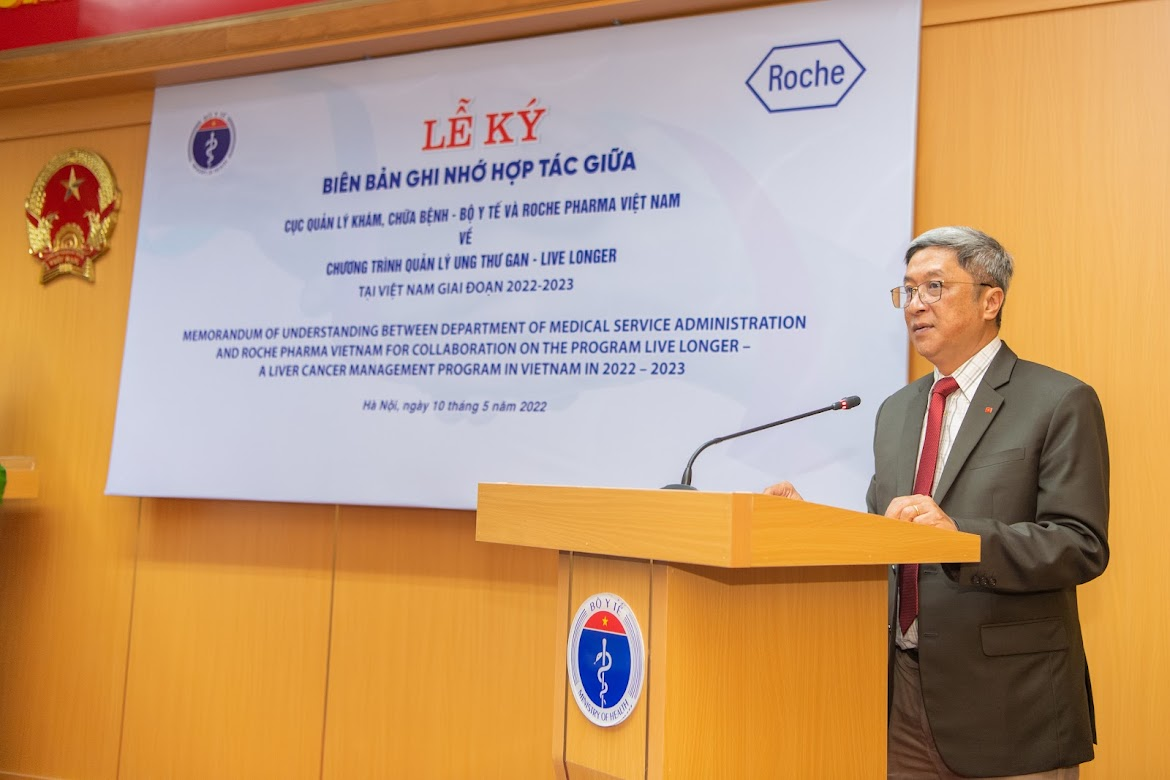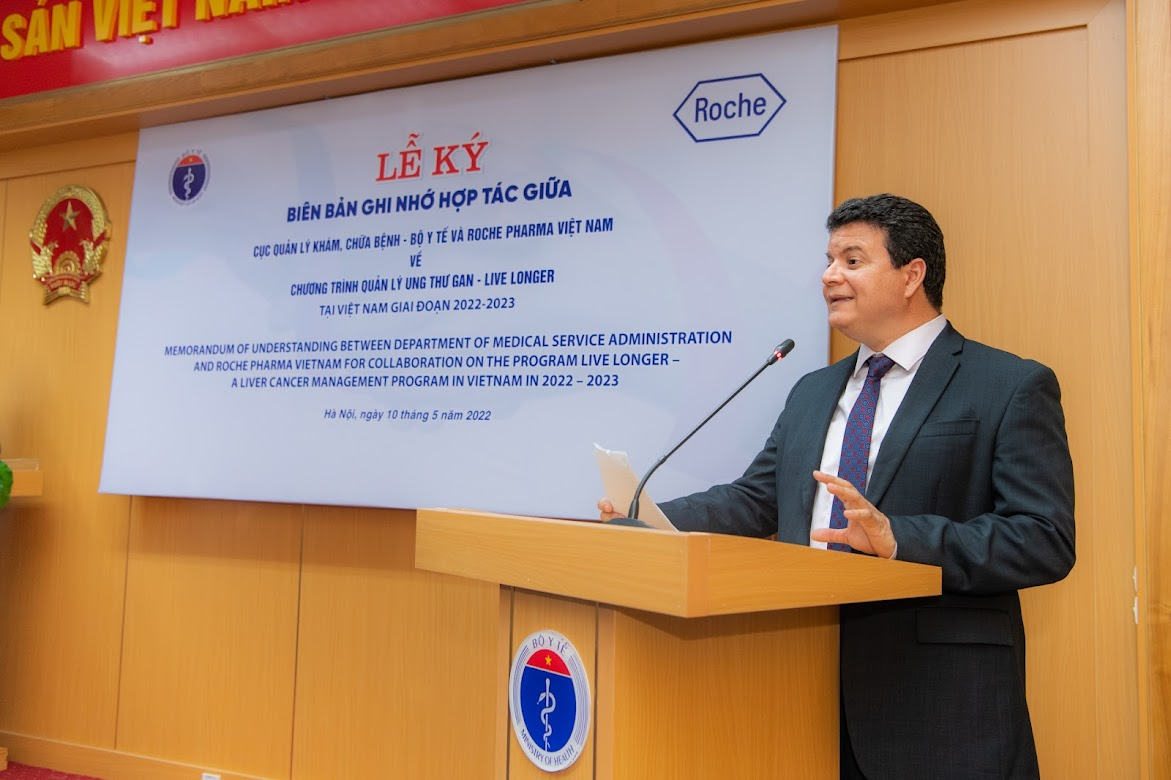Roche Vietnam and Medical Service Administration sign MoU for liver cancer programme
 |
| The MoU signing ceremony between Roche and the Medical Service Administration |
Liver cancer is the leading cancer type in Vietnam in terms of both morbidity and mortality, with hepatocellular carcinoma being the main cause. The Live Longer programme aims to increase awareness and build the capacity for diagnosis, treatment, and management of the disease.
To solve the greatest challenges, the Medical Service Administration (MSA) and Roche Vietnam signed the MoU to implement the Live Longer programme for high-risk patients in the country.
| To solve the greatest challenges of liver cancer, the Medical Service Administration (MSA) and Roche Vietnam signed the MoU to implement the Live Longer programme for high-risk patients in the country. |
The programme will be implemented by MSA as the managing unit and Roche Vietnam as the companion unit. It will be run in cooperation with the Department of Health Insurance under the Ministry of Health (MoH), the Vietnam Association for the Study of Liver Disease, and six hospitals including K hospital, Bach Mai, Hanoi Oncology hospital, Ho Chi Minh City University Medical Centre, Ho Chi Minh City Oncology Hospital, and Cho Ray hospitals.
Speaking at the signing ceremony, Nguyen Truong Son, Deputy Minister of Health said, “Cancers, especially liver cancer, are a leading threat to human health. The Live Longer cancer management programme will be an important piece of the MoH’s strategy for managing liver diseases and the National Plan for the Prevention and Control of Non-communicable Diseases and Mental Health Disorders for the next five years.”
 |
| Nguyen Truong Son, Deputy Minister of Health, giving his remarks at the MoU signing ceremony |
Luong Ngoc Khue, director of MSA emphasised, “To prevent and treat liver cancer effectively and sustainably we need cross-stakeholder cooperation involving the private sector and healthcare partners. The partnership signed today will make a positive contribution towards raising awareness for early prevention as well as improving the capacity of liver cancer treatments.”
According to Lennor Carrillo, general director at Roche Vietnam – a leading pharmaceutical group – Roche is committed to helping patients to access advanced therapies in Vietnam.
During its nearly three decades of operation in the country, the company has cooperated with the government, hospitals, and physicians to improve the healthcare system through a variety of activities.
“We are pleased to continue to accompany the medical industry in this new project for liver cancer patients. We believe that the project will create a solid foundation for improving the quality of life and survival time for liver cancer patients in Vietnam,” Carillo added.
 |
| Lennor Carrillo, general director at Roche Vietnam, speaking at the ceremony |
The Live Longer programme seeks to increase awareness of liver cancer for the public, including people in high-risk groups in the midterm and the general population in the long term. It will improve the efficiency of diagnosis and treatment for medical facilities and enhance access to systemic treatments for liver cancer patients.
The objectives related to health capacity building are focused on the six participating hospitals. Depending on the actual situation and effectiveness, the MSA will later decide on whether to expand the programme to more medical facilities.
According to the Globocan Report 2020, there have been around 26,500 incidences of liver cancer a year, accounting for 14.5 per cent of all cancers. Liver cancer also leads in mortality rates with over 25,270 cases, accounting for 21 per cent of the total number of cancer deaths – 3.8 times higher than the 6,700 lives claimed by traffic accidents in 2020.
The earliest clinical symptoms of liver cancer are often atypical and easily missed and the progression of the disease can take up to 30 years. Therefore, liver cancer is difficult to detect early as people do not go for regular screening due to a lack of awareness.
In Vietnam, most patients are detected at a late stage. Routine liver cancer screening every six months for high-risk groups could drastically improve detection and survival rates alike. Curative treatments for early-stage liver cancer such as liver resection or liver transplant significantly improve the patient’s chances of survival.
Therefore, raising public awareness for early screening, improving medical capacity, and facilitating patient access to the most appropriate and advanced therapies at each stage are effective solutions in the prevention and treatment of liver cancer.
What the stars mean:
★ Poor ★ ★ Promising ★★★ Good ★★★★ Very good ★★★★★ Exceptional
Related Contents
Latest News
More News
- Digital publishing emerges as key growth driver in Vietnam (January 30, 2026 | 10:59)
- EVN signs key contract for Tri An hydropower expansion (January 30, 2026 | 10:57)
- Vietnam to lead trade growth in ASEAN (January 29, 2026 | 15:08)
- Carlsberg Vietnam delivers Lunar New Year support in central region (January 28, 2026 | 17:19)
- TikTok penalised $35,000 in Vietnam for consumer protection violations (January 28, 2026 | 17:15)
- Digital economy takes centre stage in Vietnam’s new growth model (January 28, 2026 | 11:43)
- EU Council president to visit Vietnam amid partnership upgrade (January 28, 2026 | 11:00)
- Vietnam entering a new growth phase in 2026 (January 28, 2026 | 10:02)
- VIMC targets higher profit and throughput in 2026 (January 26, 2026 | 19:00)
- GEVA a launchpad for Vietnam’s agricultural exports (January 26, 2026 | 12:03)

 Tag:
Tag:


























 Mobile Version
Mobile Version